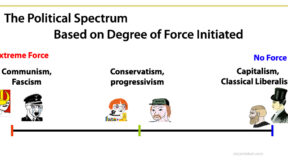An article on reason.com, this one, tries to deflect progressive attacks on libertarianism. It explains why libertarianism is not equal to selfishness, and that critics will have to peruse another line of attack? But I am not so sure they will have too. The gist of the reasoning in the article basically says that.
“It makes no difference whether action springs from altruistic or from egoistic motives, from a noble or from a base disposition; whether it is directed toward the attainment of materialistic or idealistic ends; whether it arises from exhaustive and painstaking deliberation or follows fleeting impulses and passions”.
Thus it continues, “At the center of libertarianism and free-market economics, then, lies not wealth but liberty—the freedom of people to cooperate in the pursuit of diverse values, some “self-regarding,” some not. Wealth is merely one part of a much larger story.”
So as the article explains the main value of libertarianism is not self interested action, or altruistic action, or any type of action or pursuit of any particular ideal, but that all actions and pursuits are left free and voluntary. The problem with this view and this type of defense is that the value of freedom is ultimately a selfish ideal in its self. In fact any value is not a primary, all values presupposes an answer to the question: of value to whom? So what does the value of freedom entail?
It is true freedom is not any particular action or the pursuit of any particular ideal. Freedom is the right to the pursuit of any action or ideals, it is the right to choose what constitutes your own private, personal, individual happiness and to work for its achievement, so long as you respect the same right in others. It means that a man cannot be forced to devote his life to the pursuits of another man nor of any number of other men. Thus, freedom is the ultimate selfish value. It is the right to decide for YOURSELF whether your actions will “springs from altruistic or from egoistic motives, from a noble or from a base disposition; whether they will be directed toward the attainment of materialistic or idealistic ends; whether they will arise from exhaustive and painstaking deliberation or follow fleeting impulses and passions.”
Libertarian philosophy springs from ultimately a selfish morality. That is why deflecting from it will not work, you need to embrace it and defend selfishness. To whom is freedom a value a progressive will ask. If you say to me, then you are selfish, and need to sacrifice some of your freedoms so that others can benefit. At that point if you are not willing to defend your self morally, to defend rational self interest, then you lose. If you answer that it is a value to everyone, the you accept the progressive premise that something is good only if it benefits someone other then your self. Thus, people’s lives are only free to live if their actions benefit others, and so begins the perpetual debate of what actions benefit the economy.
“To redeem both man and morality, it is the concept of “selfishness” that one has to redeem.” -Ayn Rand-
Not convinced that selfishness needs to be defended? Think about what a free trade principle means. It is the principle that each trader decides how much, and what value they will give up in a voluntary exchange for some other value in some quantity. Whether you are mother Teresa, giving material value and expecting no value in return, or Donald Trump, trading one material value for another, your actions and decisions are self directed. The only way an action can be, not self directed is if someone forces you or coerces you. The free market is about all actions being self directed, which the progressives find as selfish, thus immoral, and attack libertarians for their support of such ideas, and try to claim the right to coerce, and trying to justify it with an altruistic morality.
Libertarianism is all about none coercion. Freedom and liberty, the two values libertarians are about , mean a system of human relationships absent of coercion. No one person or any number of people have the right to coerce any other person or any other number of people. What philosophy, what idea, explains and justifies such a system? The founding fathers explained it best, that a man has a right to his own life, to his own liberty, to the pursuit of his own happiness, which means: man’s right to exist for his own sake. That is inherently a selfish statement, and it is what is being attacked when you start to hear calls for sacrifice by the progressives. The attack always comes in a form of a moral perspective. The tactic of appeasing this perspective, or deflecting from it, will, and does not work . Take argument for example, concerning housing, also adopted by the conservatives.
“Home ownership is part of American dream, but the greedy bankers are taking away that dream, from millions of people by charging excessive interest rates, and engaging in discriminatory practices. So the government can lend a helping hand and make the American dream a reality for millions of people. Are we going to be a society that helps people achieve their dreams, or the kind of society that leaves them at the mercy of bankers that don’t care about anything more then making money.”
What is your counter argument? That libertarianism is not about making money, its about liberty, so the bankers should be left free? No one is going to believe that. You can try to point out that the interest rate can not be artificially set low by the government, that this will make things worse. They might listen and increase the rate a little,but they are still going to roll over you. And truth be told, we, libertarians and other freedom loving people have been consistently losing these battles.
I want to start winning, and for that libertarians, need to embrace that their philosophy is inherently a selfish one, that the pursuit of rational self interest is the moral purpose of a human’s life. It is not going to be easy to defend this. The attacks will be eminent, but predictive. They will compare you to a thief, and explain that a thief steals for his self interest. But a thief is not immoral because he acts in his self interest, he is immoral for what he finds to be in his self interest.
Having a moral defense, however, will provide a powerful weapon in any ideological battle. Armed with economic facts and logic, and now with a morality logically compatible with the ideals of freedom, the arguments will be undefeatable, or at least much more effective. In fact that is how the founding fathers did it. They stated that your life belongs to you, and you only. Any argument against that will begin to sound a lot like slavery.




